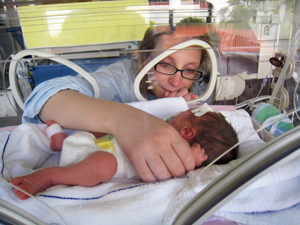Interacting with Your Premature Baby in the NICU
Interacting with Your Premature Baby in the NICU
Premature babies are cared for in the NICU (neonatal intensive care unit). NICU staff can take care of your baby’s medical needs. Your presence is just as important. Only you can give your baby a parent’s love and care. You may find the NICU scary and confusing at first. But despite the wires, tubes, and machines, you can still begin to form a lifelong bond with your baby. That feeling of warmth and connection is good for both of you. Mothers and fathers often have many of the same feelings about having a sick baby, but they may show those feelings differently—and that's OK. Be patient with each other.
Who can visit the NICU?
As a parent, you can most likely stay with your baby throughout much of the day. Talk with your baby’s nurse about when you can visit. Your baby’s brothers, sisters, and grandparents may not be allowed in the NICU or may be able to make only short visits. This is to protect your baby from infection and from too much excitement.
Holding and touching your baby
Very early preemies have skin that is thin and fragile. So they may not be able to cope well with being touched. But as your baby grows and develops, touch can be pleasant for you and your baby. Depending on your baby’s gestational age, NICU staff may suggest:
Containment: This means putting your hands and arms on either side of your baby while the baby lies in bed. Preemies like this because it’s much like what they experienced in the womb.
Light touch: Stroking your baby may be too much stimulation. A steady touch is best.
Kangaroo care: As soon as your baby is ready, skin-to-skin contact is an important step. This is your chance to hold and cuddle your baby. Adjust your shirt so you can hold your baby against your bare skin. Cover your baby with the shirt or a blanket to stay warm. Kangaroo care can be relaxing for you and your baby. It may also help your baby recover better or more quickly from some of the medical problems preemies have.
Non-nutritive (comfort) breastfeeding: Because of tubes in the mouth and taped to the face, babies in the NICU sometimes develop “oral aversion.” Holding your baby and having your baby suckle, even without getting any milk, can help your baby overcome oral aversion. It will also help your baby develop the ability to feed at the breast and will help you make more milk.
Your presence at the bedside: Your baby knows your voice and scent so being at the bedside is important. Your voice can help your baby be calm so he or she can grow and get better. Once your baby is feeling better, your nurse will show you how you can place your hands on your infant to help your baby feel secure. As your baby feels better, the nurse will let you know when you can help with your baby's care.
Creating a soothing environment
Preemies can be very sensitive to touch, sound, bright light, and other forms of stimulation. To keep your baby as comfortable as possible:
Let your baby sleep when he or she needs to.
Keep noise and bright lights to a minimum.
Try not to hit things on the incubator, talk in a loud voice, or slam doors.
If lights seem too bright, ask a nurse if you can drape a blanket over the incubator.
Other ways you can be involved
Personalize your baby’s environment. But first, check with a nurse about what is and isn’t allowed and what’s safe for your baby.
When your baby is awake, talk or sing in a quiet voice.
Participate in your baby’s care as advised by your baby’s nurse. This may include diapering, breast or bottle feeding, or taking your baby’s temperature. If your baby is very sick, NICU staff may need to take on more of these tasks, but there is always something you can do.
Work with NICU staff to develop a plan of care for your baby.
Share your sense of how your baby is doing with NICU staff. As you get to know your baby, you may notice subtle changes that nobody else does.
Make sure to take care of yourself, too. If you are feeling sick, it's important that you tell the NICU staff and avoid visiting if they feel your baby could catch a cold or other infections from you. As difficult as this is, it's important that your baby stay as healthy as possible. Ask the NICU staff or your healthcare provider about other ways to protect your baby, such as making sure you have had the Tdap vaccine and a seasonal flu shot.
How preemies express themselves
Preemies move less and make less noise than term babies. Their facial expressions are more subtle. Look for these signs and try to get to know how your baby shows different moods.
Signs of contentment or pleasure:
Relaxed arms and legs
Alertness
Cooing
Looking around
Signs of stress:
Tremors, twitches
Holding arms or legs out stiff, a hand up like a "stop sign," or arching the back
Gasping, fussing, or crying
Lack of response ("shutting down")
Color changes
Gagging
Hiccups
Updated:
July 27, 2018
Sources:
Coping With the Neonatal Intensive Care Unit Experience. V.C. Smith. Journal of Perinatal & Neonatal Nursing. 2012;26(4):343-352., The Effects of Kangaroo Care in the Neonatal Intensive Care Unit on the Physiological Functions of Preterm Infants, Maternal–Infant Attachment, and Maternal Stress. E.S. Cho. Journal of Pediatric Nursing. 2016;31:430-38.
Reviewed By:
Freeborn, Donna, PhD, CNM, FNP,Image reviewed by StayWell art team.,Lee, Kimberly G., MD, MSc, IBCLC
